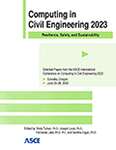Investigating the Trends in the Adoption and Implementation of Sustainable Building Rating Systems: A Critical Analysis of the LEED Rating System
Publication: Computing in Civil Engineering 2023
ABSTRACT
Green building rating systems have grown exponentially in popularity since the 1990s due to the increasing need to minimize the negative impact of buildings on the environment. These systems provide a framework for healthy, highly efficient buildings, lowering operational costs, and greenhouse gas emissions while improving the quality of buildings for occupants. This study describes the importance of sustainable building rating systems, analyzes the trends in the adoption of the Leadership in Energy and Environmental Design (LEED) rating system, and critiques key factors that influence the adoption of sustainable building rating systems. Cross tabulations and trend analysis were completed to analyze the patterns in the adoption of the LEED rating system. One of the trends was a surge in registration of projects due to anticipated changes to the LEED rating system. The insights generated by this research are valuable resources for fellow investigators seeking updated information on LEED certification practices.
Get full access to this article
View all available purchase options and get full access to this chapter.
REFERENCES
Abraham, Y., Greenwood, L., Andoh, N. Y., and Schneider, J. (2022). Sustainable building without certification: An exploration of implications and trends. J. Sustainability Res. 4 (2). https://doi.org/10.20900/jsr20220007.
Alyamia, S. H., and Rezgui, Y. (2012). Sustainable building assessment tool development approach. Sustainable Cities Soc. 5, 52–62.
Ando, S., Arima, T., Bogaki, K., Hasegawa, H., Hoyano, A., and Ikaga, T. (2005). Architecture for a sustainable future. Architectural Institute of Japan, Tokyo.
Bribián, I. Z., Capilla, A. V., and Usón, A. A. (2011). Life cycle assessment of building materials: Comparative analysis of energy and environmental impacts and evaluation. Build. Environ. 46(5), 1133–1140.
BRE (Building Research Establishment). (2023). BREEAM Homepage. https://www.breeam.com/ (May 1, 2023).
Celik, B. G. (2006). Decision model to optimize indoor air quality in commercial buildings in Florida. University of Florida.
Cole, R. J., and Valdebenito, M. J. (2013). The importation of building environmental certification systems: International usages of BREEAM and LEED. Building Research & Information. 41 (6), 662–676.
Fowler, K. M., and Rauch, E. M. (2006). Sustainable building rating systems summary. Richland, WA (United States): Pacific Northwest National Lab (PNNL).
GBI (Green Building Initiative). (2023). About Green Globes. http://www.greenglobes.com/about.asp (April 28, 2023).
Haapio, A., and Viitaniemi, P. (2008). A critical review of building environmental assessment tools. Environmental Impact Assessment Review. 28, 469–482.
Holmes, S. (2014). LEED. Retrieved 2020, from LEED registration close and sunset dates. https://www.usgbc.org/articles/leed-registration-close-and-sunset-dates. (April 28, 2023).
ILFI (International Living Future Institute). (2022). Living Building Challenge Homepage. https://living-future.org/lbc-3_1/basics/ (April 25, 2023).
Kellenberger, D., and Althaus, H.-J. (2009). Relevance of simplifications in LCA of building components. Build. Environ. 44, 818–825.
Kibert, C. (2008). Sustainable Construction: Green Building Design and Delivery (Vol. Second edition). John Willey and Sons.
Kokame, K. (2017). More Than Just a Glass Face: What Makes a “Green” or “Sustainable” Building, Exactly? Pomona Senior Theses.
Pulselli, R., Simoncini, E., Pulselli, F., and Bastianoni, S. (2007). Emergy analysis of building manufacturing, maintenance and use: Em-building indices to evaluate housing sustainability. Energy Build. 39(5), 620–628.
Rode, P., Burdett, R., and Goncalves, J. S. (2011). Buildings: investing in energy and resource.
Sharifi, A., and Murayama, A. (2014). Neighborhood sustainability assessment in action: Cross-evaluation of three assessment systems and their cases from the US, the UK, and Japan. Build. Environ. 72, 243–258.
Suzer, O. (2015). A comparative review of environmental concern prioritization: LEED vs. other major certification systems. J. Environ. Manage. 154, 266–283.
Tang, K. (2018). Climate change in Malaysia: Trends, contributors, impacts, mitigation and adaptations. Science of the Total Environment. 650, 1858–1871.
Taylor, B. (2013). Sustainability and Performance Measurement: Corporate Real Estate Perspectives. Performance Improvement. 52, 36–45.
UN (United Nations). (2023). 2030 Agenda for Sustainable Development. https://www.un.org/development/desa/jpo/wp-content/uploads/sites/55/2017/02/2030-Agenda-for-Sustainable-Development-KCSD-Primer-new.pdf (April 21, 2023).
USGBC (United States Green Building Council). (2022). LEED hits 100,000 certified projects. https://www.usgbc.org/articles/leed-hits-100000-certified-projects (April 22, 2023).
USGBC. (2023a). LEED Homepage. Retrieved from https://www.usgbc.org/leed.
USGBC. (2023b). LEED v4.1. https://www.usgbc.org/leed/v41 (April 28, 2023).
US EIA (United States Energy Information Administration). (2019). International Energy Outlook 2019. https://www.eia.gov/outlooks/ieo/pdf/ieo2019.pdf (April 25, 2023).
Weißenbergera, M., Jenschb, W., and Langc, W. (2014). The convergence of life cycle assessment and nearly zero-energy buildings: The case of Germany. Energy Build. 76, 551–557.
WGBC (World Green Building Council). (2017). Towards a zero-emission, efficient, and resilient buildings and construction sector. https://worldgbc.org/article/2018-global-status-report-towards-a-zero-emission-efficient-and-resilient-buildings-and-construction-sector/ (April 28, 2023).
Wong, J., and Zhou, J. (2015). Enhancing environmental sustainability over building life cycles through green BIM: A review. Autom. Constr. 57, 156–165.
Yilmaz, M., and Bakis, A. (2015). Sustainability in Construction Sector. Procedia Soc Behav Sci, 195, 2253–2262.
Zhang, Y., Kang, J., and Jin, H. (2018). A review of green building development in China from the perspective of energy saving. Energies. 11(2), 334.
Information & Authors
Information
Published In
History
Published online: Jan 25, 2024
ASCE Technical Topics:
- [Inorganic compounds]
- Analysis (by type)
- Architectural engineering
- Benefit cost ratios
- Building design
- Building systems
- Buildings
- Business management
- Carbon compounds
- Carbon dioxide
- Chemicals
- Chemistry
- Design (by type)
- Engineering fundamentals
- Environmental engineering
- Financial management
- Green buildings
- Management methods
- Organic compounds
- Practice and Profession
- Ratings
- Structural engineering
- Structures (by type)
- Sustainable development
- System analysis
Authors
Metrics & Citations
Metrics
Citations
Download citation
If you have the appropriate software installed, you can download article citation data to the citation manager of your choice. Simply select your manager software from the list below and click Download.
